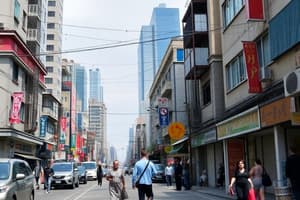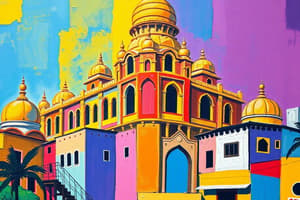Podcast
Questions and Answers
Qu'est-ce que l'embourgeoisement ?
Qu'est-ce que l'embourgeoisement ?
- Adoption de manières bourgeois (correct)
- Migration massive vers les villes
- Accès inégal aux technologies
- Transformation des zones agricoles
Quel est le principal moteur de la mondialisation ?
Quel est le principal moteur de la mondialisation ?
- Les firmes transnationales
- Les mouvements de capitaux (correct)
- Les infrastructures urbaines
- Les migrations rurales
Qu'est-ce que la fracture numérique ?
Qu'est-ce que la fracture numérique ?
- Croissance rapide de la population urbaine
- Séparation entre zones urbaines et rurales
- Différentiation fonctionnelle de la ville
- Inégalité d'accès aux technologies de l'information (correct)
L'explosion urbaine se réfère à :
L'explosion urbaine se réfère à :
Les espaces périurbains se caractérisent par :
Les espaces périurbains se caractérisent par :
Quel effet l'étalement urbain a-t-il sur les zones naturelles ?
Quel effet l'étalement urbain a-t-il sur les zones naturelles ?
Qu'est-ce qui définit une firme transnationale ?
Qu'est-ce qui définit une firme transnationale ?
La fracture sociale est liée à :
La fracture sociale est liée à :
Qu'est-ce que l'interdépendance dans un contexte de mondialisation ?
Qu'est-ce que l'interdépendance dans un contexte de mondialisation ?
Quel est le principal objectif de l'internationalisation ?
Quel est le principal objectif de l'internationalisation ?
Quelle est la caractéristique principale de l'industrialisation ?
Quelle est la caractéristique principale de l'industrialisation ?
Comment l'industrialisation affecte-t-elle la productivité ?
Comment l'industrialisation affecte-t-elle la productivité ?
Dans quel type d'environnement s'effectue généralement l'industrialisation ?
Dans quel type d'environnement s'effectue généralement l'industrialisation ?
Quel est un effet possible de l'interdépendance entre les pays ?
Quel est un effet possible de l'interdépendance entre les pays ?
Quel rôle jouent les travailleurs dans l'industrialisation ?
Quel rôle jouent les travailleurs dans l'industrialisation ?
Quelle affirmation décrit le mieux la mondialisation ?
Quelle affirmation décrit le mieux la mondialisation ?
Quel terme désigne un réseau mondial de grandes métropoles interconnectées ?
Quel terme désigne un réseau mondial de grandes métropoles interconnectées ?
Quel concept se réfère à la concentration croissante des populations et des activités économiques dans les grandes villes ?
Quel concept se réfère à la concentration croissante des populations et des activités économiques dans les grandes villes ?
Quel terme définit une grande ville influente sur une vaste région avec des infrastructures de transport ?
Quel terme définit une grande ville influente sur une vaste région avec des infrastructures de transport ?
Quel processus historique est associé à l'enrichissement de la métropole par les colonies ?
Quel processus historique est associé à l'enrichissement de la métropole par les colonies ?
Qu'est-ce qui définit une mégalopole ?
Qu'est-ce qui définit une mégalopole ?
Quel est l'effet de la mondialisation sur les économies et sociétés ?
Quel est l'effet de la mondialisation sur les économies et sociétés ?
Comment le marketing territorial aide-t-il les États ?
Comment le marketing territorial aide-t-il les États ?
Quel est le rôle principal d'une multinationale ?
Quel est le rôle principal d'une multinationale ?
Quel est le but principal de l'Initiative pays pauvres très endettés (PPTE) ?
Quel est le but principal de l'Initiative pays pauvres très endettés (PPTE) ?
Comment peut-on définir une région ?
Comment peut-on définir une région ?
Quel processus décrit la situation où des régions renforcent leur autonomie pour mieux concurrencer ?
Quel processus décrit la situation où des régions renforcent leur autonomie pour mieux concurrencer ?
Quel est le rôle d'un pôle dans un contexte économique ?
Quel est le rôle d'un pôle dans un contexte économique ?
Quel type de contrat décrit un partenariat public-privé (PPP) ?
Quel type de contrat décrit un partenariat public-privé (PPP) ?
Qu'est-ce que la sécurité urbaine ?
Qu'est-ce que la sécurité urbaine ?
Quel terme désigne le processus d'urbanisation des périphéries des grands centres urbains ?
Quel terme désigne le processus d'urbanisation des périphéries des grands centres urbains ?
Quel est le principe fondamental de la théorie du Système-Monde ?
Quel est le principe fondamental de la théorie du Système-Monde ?
Comment peut-on définir la croissance démographique ?
Comment peut-on définir la croissance démographique ?
Quelle est la caractéristique principale de la conurbanisation ?
Quelle est la caractéristique principale de la conurbanisation ?
Qu'est-ce que la délocalisation implique principalement ?
Qu'est-ce que la délocalisation implique principalement ?
Quel terme décrit la tendance des flux à s'éloigner du centre urbain ?
Quel terme décrit la tendance des flux à s'éloigner du centre urbain ?
La dérégulation vise généralement à :
La dérégulation vise généralement à :
Comment définiriez-vous une edge city ?
Comment définiriez-vous une edge city ?
Quel est l'objectif principal du développement dans une société ?
Quel est l'objectif principal du développement dans une société ?
Qu'est-ce que le concept d'économie-monde représente ?
Qu'est-ce que le concept d'économie-monde représente ?
Quel est le principal moteur de la suburbanisation?
Quel est le principal moteur de la suburbanisation?
Qu'est-ce que la ségrégation socio-spatiale implique?
Qu'est-ce que la ségrégation socio-spatiale implique?
Quelles sont les trois grandes zones économiques de la Triade?
Quelles sont les trois grandes zones économiques de la Triade?
Quel facteur est essentiel pour définir une ville selon le critère démographique?
Quel facteur est essentiel pour définir une ville selon le critère démographique?
Quels éléments sont caractéristiques d'une ville cosmopolite?
Quels éléments sont caractéristiques d'une ville cosmopolite?
Quelle définition correspond au concept de thalassotropisme?
Quelle définition correspond au concept de thalassotropisme?
Quel est l'effet de la transition démographique sur la population d'un pays?
Quel est l'effet de la transition démographique sur la population d'un pays?
Quelle est la principale caractéristique des villes off?
Quelle est la principale caractéristique des villes off?
Flashcards
Croissance démographique
Croissance démographique
Difference in population size between the end and start of a period, usually a year.
Conurbanisation
Conurbanisation
Large urban area formed by the merging of geographically connected urban areas.
Centrifuge
Centrifuge
Economic and social activities moving away from an urban center.
Délocalisation
Délocalisation
Signup and view all the flashcards
Développement
Développement
Signup and view all the flashcards
Dérégulation
Dérégulation
Signup and view all the flashcards
Edge city
Edge city
Signup and view all the flashcards
Économie-monde
Économie-monde
Signup and view all the flashcards
Embourgeoisement
Embourgeoisement
Signup and view all the flashcards
Interdependence
Interdependence
Signup and view all the flashcards
Exode rural
Exode rural
Signup and view all the flashcards
Internationalization
Internationalization
Signup and view all the flashcards
Industrialization
Industrialization
Signup and view all the flashcards
Espace urbanisé
Espace urbanisé
Signup and view all the flashcards
Manufacturing chain
Manufacturing chain
Signup and view all the flashcards
Espace périurbain
Espace périurbain
Signup and view all the flashcards
Etalement urbain
Etalement urbain
Signup and view all the flashcards
Production chain
Production chain
Signup and view all the flashcards
Explosion urbaine
Explosion urbaine
Signup and view all the flashcards
Productivity
Productivity
Signup and view all the flashcards
Work
Work
Signup and view all the flashcards
Firme Transnationale (FTN)
Firme Transnationale (FTN)
Signup and view all the flashcards
Strict regulations
Strict regulations
Signup and view all the flashcards
Fracture sociale
Fracture sociale
Signup and view all the flashcards
Marché
Marché
Signup and view all the flashcards
Périurbanisation
Périurbanisation
Signup and view all the flashcards
PPTE
PPTE
Signup and view all the flashcards
Marketing Territorial
Marketing Territorial
Signup and view all the flashcards
PPP
PPP
Signup and view all the flashcards
Mégalopole
Mégalopole
Signup and view all the flashcards
Métropolisation
Métropolisation
Signup and view all the flashcards
Pôle
Pôle
Signup and view all the flashcards
Politiques d'ajustement structurel (PAS)
Politiques d'ajustement structurel (PAS)
Signup and view all the flashcards
Mondialisation
Mondialisation
Signup and view all the flashcards
Région
Région
Signup and view all the flashcards
Multinationale
Multinationale
Signup and view all the flashcards
Métropole
Métropole
Signup and view all the flashcards
Rurbanisation
Rurbanisation
Signup and view all the flashcards
Sécurité urbaine
Sécurité urbaine
Signup and view all the flashcards
Mercantilisme
Mercantilisme
Signup and view all the flashcards
Suburbanisation
Suburbanisation
Signup and view all the flashcards
Social segregation
Social segregation
Signup and view all the flashcards
Triade
Triade
Signup and view all the flashcards
Urbanization rate
Urbanization rate
Signup and view all the flashcards
Transition demographic
Transition demographic
Signup and view all the flashcards
Tératopole
Tératopole
Signup and view all the flashcards
Urbanization
Urbanization
Signup and view all the flashcards
Ville (city)
Ville (city)
Signup and view all the flashcards
Study Notes
Urbanisation and Globalization
-
Urbanization: Increase in the proportion of people living in urban areas. A process of population increase in cities. The movement of people from rural to urban areas.
-
Globalization: Interconnectedness and interdependence of economies, cultures, and societies across the globe. A multi-faceted process.
Definitions
-
3T: Talent, Technology, Tolerance. The core of interactions between public, private, civil society, and universities.
-
Axe: A geographical and economic line connecting important regions or cities, facilitating the flow of goods, services, and people.
-
Agglomeration: A cluster of dwellings where no dwelling is more than 200 meters apart in Europe, or 500 meters in newer countries where settlements are less dense.
-
Natural input: The number of births within an urban population of a given country.
-
Attractiveness: The characteristic of something appealing.
-
Adaptation to Environment: The changing traits of a species in response to environmental alterations. This enables survival.
-
Shantytown: A district or area of temporary, often poor-quality housing, often informal, with limited access to public services. Commonly found in developing countries.
-
Shantytown growth: The spreading of shantytowns around large cities, often due to rural migration and population growth.
-
BRICS: An economic grouping of Brazil, Russia, India, China, and South Africa. Aims for economic and political cooperation.
-
Capitalism: Economic system centered on private ownership of production means and profit. Relies on free enterprise, competition, and investment for value creation.
-
Capital: Financial or economic resources used for productive activities, investments, or trade. Can be private, public, national, or foreign.
Other Concepts
-
Center-Periphery: Geographical and economic model where centers (cities, regions) hold resources, power, and opportunities; less developed areas (peripheries) rely on them.
-
Business District Centre (CBD): The heart of a city's business district in major American cities. This area holds significant financial activity.
-
Triangular Trade: A historical trading route involving Europe, Africa, and America, particularly the slave trade. Traded goods include textiles, weapons, and people (enslaved Africans).
-
Population Growth: Difference in population at the beginning and end of a period. Usually one year.
-
Conurbation: A large metropolitan area formed by the merging of previously separated urban centers.
-
Centrifugal: Outward movement of economic and social forces from a central area.
-
De-localization: The transfer of manufacturing, service, or other business activities to another country from a developed country, often to reduce costs.
-
Development: Socioeconomic transformation aimed at improving quality of life, raising incomes, and providing basic services.
-
Deregulation: Reduction or removal of government rules to promote competition.
-
Edge City: A new type of city appearing on the outer edges of large metropolitan areas, featuring commerce, housing, and relatively little population density.
-
Economy of the World: The global structure organized around economic powers with interconnected interactions.
-
Evolution of Species: Species traits evolve through selection, not necessarily to fit the environment, but based on opportunities.
-
Bourgeoisie: The social class characterized by business ownership rather than manual labor. Includes attitudes and cultural traits.
-
Rural exodus: Large-scale movement of people from rural areas to urban ones for economic opportunity.
-
Urban Area: A space where buildings, roads, etc. are the dominant features. The boundaries may be political or administrative.
-
Peri-urban Space: Areas at the edge of cities where urban and rural aspects blend.
-
Urban Sprawl: The expansion of cities outward with little planning or control.
-
Explosion Urban: Rapid increase in urban population.
-
Transnational Firm (TNC): Company with operations in multiple countries.
-
Flow: The movement of goods, money, people, information, or services internationally.
-
Digital Divide: Unequal access to technology and information, often associated with socioeconomic factors.
-
Social Divide: Inequality in economic, educational, and cultural opportunities between social groups.
-
Urban Divide: Inequality in resources, facilities, and living conditions between different urban areas.
-
Fragmentation Socio-Spatial: Growing separation of social classes within cities.
-
Rural Fringe: Areas on the outskirts of cities where rural activities still dominate.
-
Secured Communities: Residential areas with high security measures, primarily intended for wealthy residents.
-
Gentrification: Transformation of a poor or working-class neighborhood into an affluent one, often leading to displacement of previous residents.
-
Globalisation: The process of increasing interconnectedness and interdependence between countries around the world.
-
Governmental Actions: Policies to control or restrict capital flow.
-
Economic History: Analyzing the development of commerce over long periods.
-
Foreign Direct Investment (FDI): Investment in an overseas business by someone or an entity from another country. Often, to expand an existing operation.
-
Internationalization: The process of opening borders to increase interaction.
-
Industrialization: The transition from agrarian societies to industrial ones, emphasizing manufacturing production.
-
Investment: Allocating capital resources in projects to generate profits.
-
Liberalism: Economic doctrine emphasizing minimal government involvement and free markets.
-
Free Trade: Removing barriers to international commerce.
-
Marketising Territory: The promotion of a territory to attract investors.
-
Megalopolis: Large urban region encompassing multiple connected cities.
-
Megalopolis Archipelagic World: Concept of interconnected global cities as an archipelago of influence.
-
Megacity/Megalopolis: A major urban area (usually over 10 million inhabitants) extending over many administrative borders or political units.
-
Metropolitan Area: A heavily populated region with a major city at its center, extending into multiple regions.
-
Metropolisation: The concentration of population and economic activity within metropolitan areas.
-
Mercantilism: A historical economic system emphasizing trade and the accumulation of wealth by a nation through national/colonial control.
-
Globalisation: A multifaceted expansion of global interconnectedness and interdependence.
-
New Industrial Countries (NICs): Developing countries experiencing rapid industrialisation and economic growth.
-
New City/Planned City: Newly developed and created city with purpose-built infrastructure.
-
Neighborhood/Urban Core: The central, older part of a city.
-
World System Theory: A framework focusing on the global economic structure. The world is divided among dominant and dependent nations. Nations that have control over markets are dominant.
-
International Trade Organizations (WTO/OMC): Institutions that facilitate and regulate world trade.
-
Opening Up: The deliberate reduction of trade barriers intended to increase international engagement.
-
Urbanization Rate: Percentage of a nation's population who reside in urban environments.
-
Demographic Transition: A model explaining the changing patterns of population growth.
-
Thalassocentrism: The development of culture or society centered on the sea.
Studying That Suits You
Use AI to generate personalized quizzes and flashcards to suit your learning preferences.




